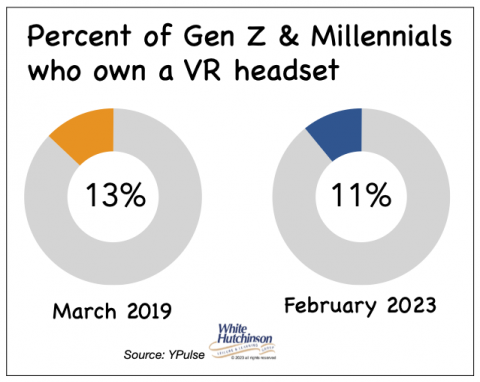
Vol. XXIII, No. 3, March 2023
- Editor's corner
- 2023 forecast for the attractions industry
- Esports isn't living up to its hype
- The weekday daytime leisure economy
- How the young adult market will shift
- Pistachio is a recent flavor trend
- For young adults, owning a VR headset is as rare today as it was in 2018
- Have we returned to pre-pandemic normalcy?
- Long waits reduce revenues and profits
- Store vacancies open opportunities
- Covid-related popularity of pickleball may be faltering
- Why LBE models need to be different today
- Competitive socializing with soccer
- It's all about perceived value, not just price
- Births down not totally bad news
- Announcing Agritourism Today
- Surge pricing comes to bowling
For young adults, owning a VR headset is as rare today as it was in 2018
Market research firm Newzoo estimates that VR gaming only accounted for 1% of total global gaming revenue last year. Success in VR has been elusive, even for big companies. Facebook parent Meta Platform's sales of its Quest VR headsets fell 20% to about seven million units last year, according to estimates by IDC. The company has cut prices on its headsets by up to 33%.

Data from YPulse shows that VR headset ownership has never taken off with young adults - Gen Z, and millennials.
It was thought that virtual reality would be the core driver towards a metaverse future, but data shows that products like VR headsets are not the surefire gamer add-on once hoped. This February, only 11% of Gen Z and millennials (ages 13-39) owned a VR headset, compared to 13% nearly four years ago in March 2019.
Even as video game companies have amped up their metaverse experiences, the desire to own VR tech remains low. There's been a decrease among Gen Z and millennials who would prefer to use VR headsets over consoles and mobile devices since 2022. Last year 48% of young consumers wanted the VR devices to game with more than others; now, only 39% say they'd prefer them. YPulse speculates this may be true because virtual worlds are thriving without VR headsets, as any game they want to play can feel immersive without full headset immersion.
Additional reading:
Subscribe to monthly Leisure eNewsletter
Vol. XXIII, No. 3, March 2023
- Editor's corner
- 2023 forecast for the attractions industry
- Esports isn't living up to its hype
- The weekday daytime leisure economy
- How the young adult market will shift
- Pistachio is a recent flavor trend
- For young adults, owning a VR headset is as rare today as it was in 2018
- Have we returned to pre-pandemic normalcy?
- Long waits reduce revenues and profits
- Store vacancies open opportunities
- Covid-related popularity of pickleball may be faltering
- Why LBE models need to be different today
- Competitive socializing with soccer
- It's all about perceived value, not just price
- Births down not totally bad news
- Announcing Agritourism Today
- Surge pricing comes to bowling


